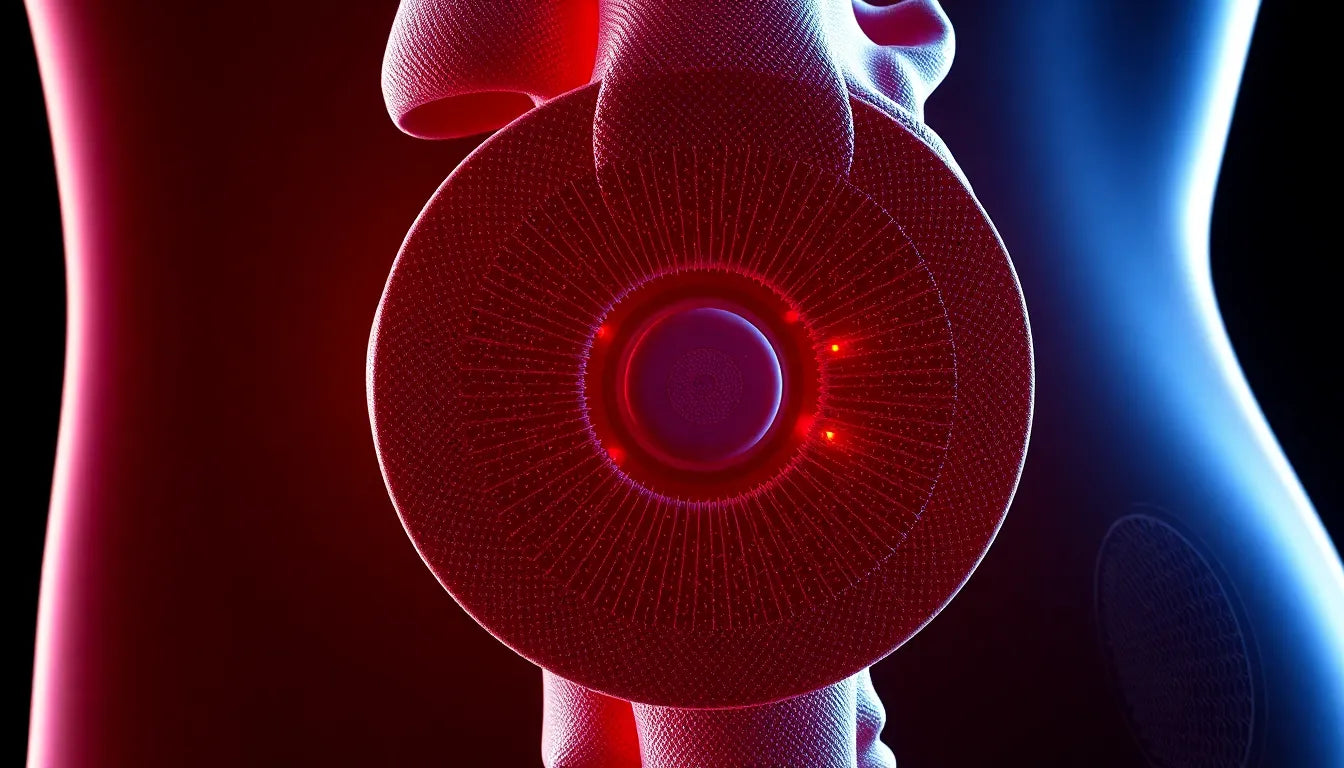When we think about herniated discs in the neck, the first symptoms that often come to mind are neck pain, arm pain, and tingling sensations. These are the classic indicators that many people experience, prompting visits to healthcare providers. However, a lesser-known question arises: can a herniated disc in the neck also cause nausea? This intriguing query opens a discussion that delves deeper into the complex relationship between neck conditions and unexpected symptoms like nausea.
Understanding the cervical spine and herniated discs
The cervical spine, comprising the uppermost part of the spine, plays a crucial role in supporting the head and facilitating a range of movements. It's made up of seven vertebrae and is susceptible to wear and tear, which can lead to herniated discs. This condition occurs when the soft inner gel of a disc protrudes through its outer layer, potentially pressing on nearby nerves. In the neck region, this can result in a variety of symptoms, primarily pain and discomfort.
Herniated discs in the cervical spine are not uncommon, affecting a significant number of individuals at some point in their lives. While the typical symptoms are well-documented, the emergence of unusual symptoms like nausea can be puzzling for both patients and medical professionals. This is because nausea is not typically associated with cervical disc herniation, yet some patients report experiencing it alongside more common symptoms.
Exploring the connection between herniated discs and nausea
The purpose of this blog post is to explore whether there is a direct or indirect connection between a herniated disc in the neck and nausea. Understanding this link is essential for providing clarity to those who experience this unexpected symptom, as well as offering insights into effective management strategies. While nausea is not a primary symptom of a herniated cervical disc, it can still occur due to a variety of factors related to the condition.
For instance, severe pain and muscle spasms resulting from nerve impingement may lead to headaches and nausea. Additionally, certain medications prescribed for managing herniated disc pain, such as opioids and NSAIDs, are known to have gastrointestinal side effects, including nausea. Another possible explanation is cervicogenic dizziness, where dysfunction in the cervical spine alters sensory input to the brain, potentially causing dizziness and nausea.
This post aims to shed light on these potential connections and provide practical advice for those navigating the challenges of living with a herniated disc in the neck, especially when unusual symptoms like nausea arise. By understanding the underlying mechanisms and exploring effective management strategies, individuals can better manage their symptoms and improve their quality of life.
Typical symptoms of a cervical herniated disc
A herniated disc in the neck, also known as a cervical herniated disc, often presents with a range of symptoms that primarily affect the upper body. The most common symptoms include neck pain, which can be sharp or dull, and radiating arm pain that follows the path of the affected nerve. Patients might also experience numbness, tingling, and muscle weakness in the shoulder, arm, or hand. These symptoms arise because the herniated disc material can press on the nerves exiting the spinal column, disrupting normal nerve function.
Treatment for a cervical herniated disc typically begins with conservative methods. Rest and the use of nonsteroidal anti-inflammatory drugs (NSAIDs) can help reduce inflammation and pain. Physical therapy is often recommended to strengthen the muscles around the neck and improve posture to alleviate pressure on the affected disc. In more severe cases, where conservative treatments fail to provide relief, surgical options may be considered. Surgery aims to remove the herniated portion of the disc to relieve pressure on the nerves.
Exploring the connection to nausea
Nausea is not a classic symptom of a cervical herniated disc, but it can occur indirectly. Understanding the mechanisms that might link neck issues to nausea is crucial for those experiencing this unexpected symptom. One potential cause is cervical vertigo or cervicogenic dizziness. This condition arises when dysfunction in the cervical spine affects sensory input to the brain, leading to dizziness and, in some cases, nausea. The altered sensory signals create a sense of imbalance, which can be unsettling enough to cause nausea.
Another factor is the presence of muscle spasms and referred pain. Severe neck muscle spasms can lead to tension headaches, which are often accompanied by nausea. The pain and discomfort from nerve impingement can also contribute to these symptoms. Additionally, medications prescribed to alleviate herniated disc pain, such as opioids and NSAIDs, are known for their gastrointestinal side effects, including nausea. These medications can irritate the stomach lining, leading to an upset stomach and nausea.
Visualizing the pathways
To better understand how a herniated disc in the neck might lead to nausea, it helps to visualize the cervical spine and the nerve pathways involved. A diagram illustrating the cervical spine can highlight how a herniated disc might compress nerves that contribute to symptoms beyond local pain. A flowchart can effectively depict the potential progression from neck issues to dizziness and nausea, offering a clear picture of the indirect pathways involved.
By recognizing these connections, individuals experiencing nausea alongside neck pain can better understand their symptoms and seek appropriate management strategies. This understanding is crucial for developing a comprehensive treatment plan that addresses both the primary and secondary symptoms of a cervical herniated disc.
General recommendations for managing herniated discs and nausea
When dealing with a herniated disc in the neck, especially when accompanied by nausea, a holistic approach to management can offer significant relief. Non-invasive treatments are often the first line of defense and focus on alleviating symptoms and improving overall well-being. Posture correction is crucial; maintaining an ergonomic position during daily activities can reduce strain on the cervical spine. Physical therapy is another beneficial option, as it strengthens neck muscles and enhances flexibility, helping to prevent further disc-related issues.
Incorporating gentle neck exercises into your routine can also be advantageous. These exercises aim to improve range of motion and alleviate stiffness, contributing to reduced discomfort. Staying hydrated is essential, as adequate fluid intake supports overall health and can mitigate some medication side effects. Rest is equally important; allowing your body time to heal can significantly impact recovery.
For those experiencing severe nausea, anti-nausea medications might be recommended. However, it is important to consult a healthcare provider before combining these with other treatments to ensure safety and efficacy.
When to seek medical attention
While many symptoms of a herniated disc can be managed with non-invasive treatments, certain red-flag symptoms necessitate professional evaluation. Persistent or worsening nausea, especially if accompanied by neurological deficits like numbness, weakness, or difficulty balancing, should prompt a visit to a healthcare provider. Additionally, if neck pain intensifies or fails to improve despite treatment, further assessment may be required to rule out other underlying conditions.
Timely medical intervention can prevent complications and facilitate a more effective treatment plan tailored to your specific needs.
Frequently asked questions
Can a pinched nerve in the neck cause nausea?
Yes, a pinched nerve in the neck can potentially cause nausea. This occurs through referred pain and nerve pathways that may affect the autonomic nervous system, leading to symptoms like dizziness and nausea. While not a classic symptom, the connection is possible, especially if the nerve impingement affects areas responsible for balance and sensory input.
What treatments help both neck pain and nausea?
Treatments that address both neck pain and nausea often include a combination of physical therapy, posture correction, and gentle exercises to relieve neck strain. Over-the-counter pain relievers and anti-nausea medications may also be used, but it is crucial to consult a healthcare provider to ensure safe and effective use. In some cases, addressing underlying issues like cervicogenic dizziness through targeted therapies can alleviate both symptoms.
Is nausea a sign of a more serious condition when associated with neck pain?
Nausea can sometimes indicate a more serious underlying issue when associated with neck pain, particularly if it persists or worsens. It may suggest complications such as increased nerve compression or other conditions affecting the cervical spine and nervous system. It is important to seek medical evaluation to determine the cause and appropriate treatment, especially if accompanied by other concerning symptoms like severe headaches, vision changes, or neurological deficits.
By understanding the potential links between a herniated disc in the neck and nausea, individuals can take proactive steps to manage their symptoms and seek appropriate care, improving their overall quality of life.
```html
Sources
- Spine-health. "Cervical Herniated Disc Symptoms and Treatment Options."
- Cleveland Clinic. "Cervical Vertigo (Cervicogenic Dizziness): Symptoms & Treatment."
- Mayo Clinic. "Herniated Disk - Diagnosis and Treatment."
- OwchHealth. "Nausea and Neck Ache: Causes, Symptoms, and Effective Relief Tips."
- The Advanced Spine Center. "Guide to Back Pain and Nausea."
- UF Health. "Cervical Herniated Disk."
- OwchHealth. "Neck Pain and Nausea: When to Seek Medical Attention."


















